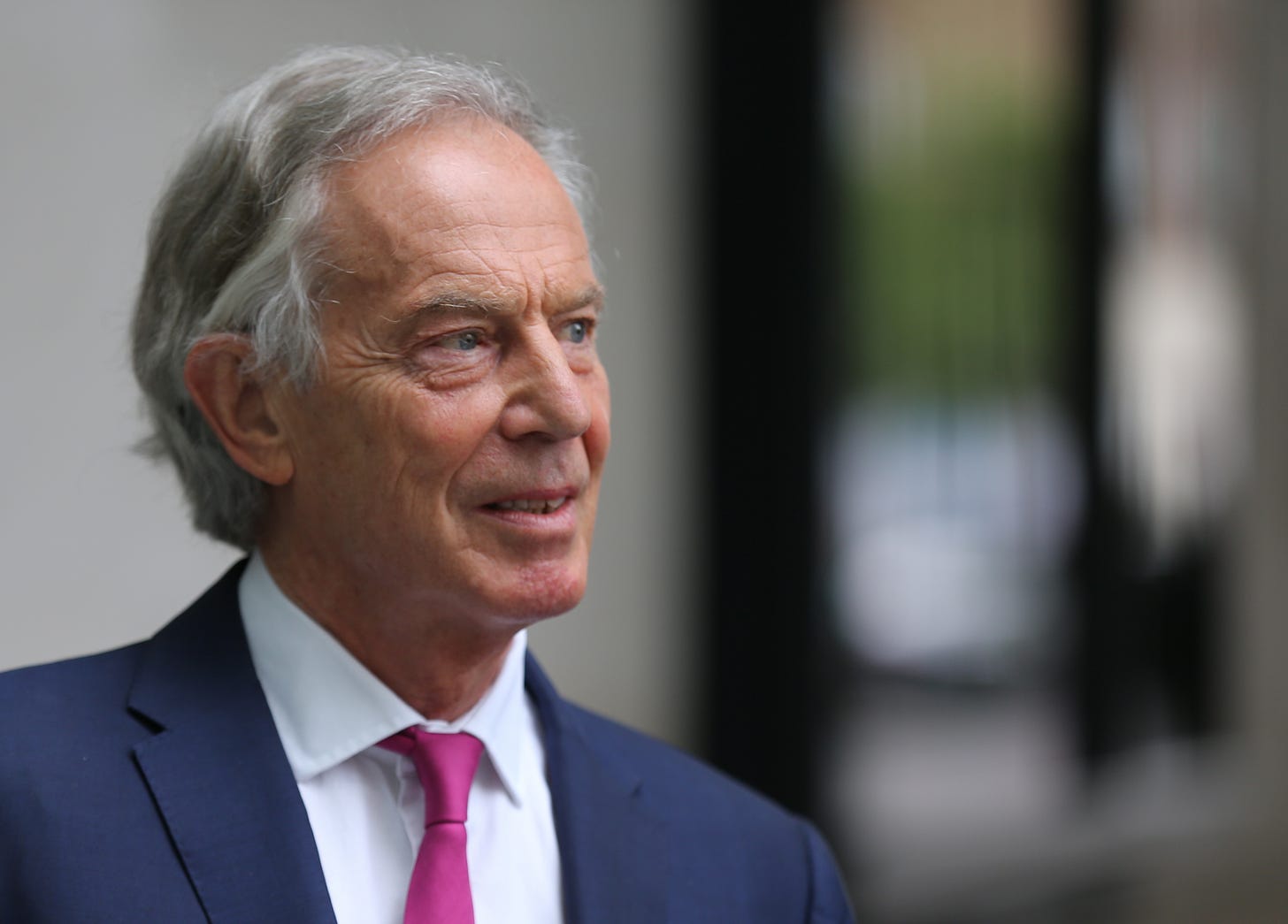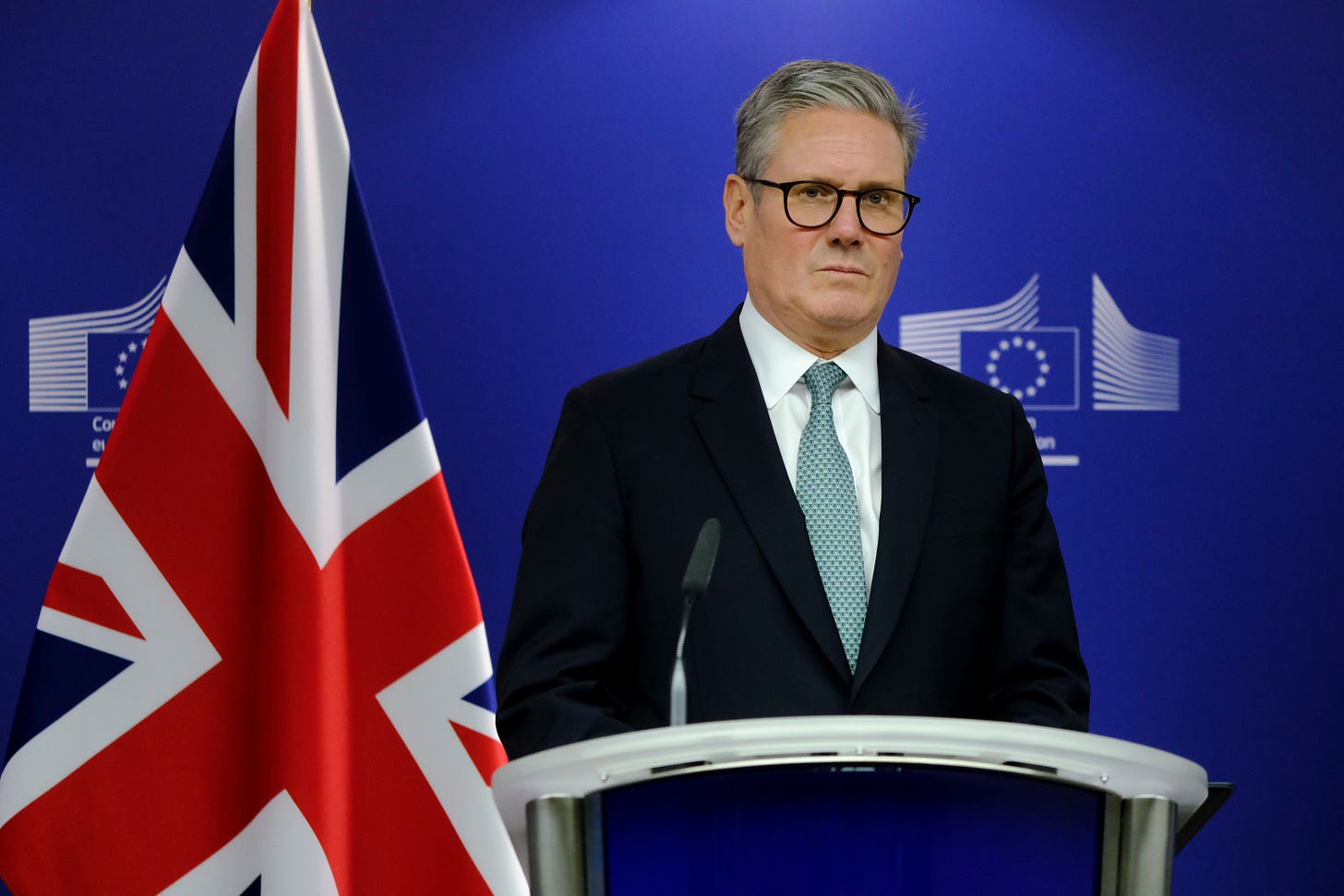Today, Sir Keir Starmer stood before the cameras and pledged that same-day GP appointments would soon be available for everyone via the NHS App, the centrepiece of his 10-year "Plan for Change". At first glance, it sounds like progress. Who wouldn't want faster access to healthcare? But as someone who has tracked digital ID schemes for years, I have always known this was brewing. The veil lifted long ago, revealing nefarious forces ruling us, and this isn't progress, it is a lure, with Tony Blair's slick persona ushering in a system to bind us tighter. The app won't even go live until 2028, yet the messaging is already everywhere. For years, we have been gently coaxed into digital healthcare, booking slots online, managing prescriptions, chatting with our GPs through screens. What started as harmless streamlining now appears to be the scaffolding for something much larger and much harder to resist.
Enter the BritCard, a newly introduced, compulsory digital ID for anyone living or working in the UK. It is being framed as a practical tool for modern identity management. But pair it with a centralised health platform and a public already worn thin by 7.6 million people on NHS waiting lists, and it starts to feel more like a digital leash. The app's delay to 2028 isn't a bug, it is a buffer, pushing potential backlash beyond this government's tenure. We have seen this tactic before. And if you think Test and Trace, the £37 billion debacle from the pandemic years, was just a failure, consider the alternative: that it was a trial run. A prototype, mislabelled as a misstep, created by the wrong hands. Starmer's revival of the Conservatives' shelved plan to monitor bank accounts under the guise of preventing welfare fraud only adds to the unease. Since the so-called plandemic, we have been swamped with health-related noise, from the assisted suicide bill to full-term abortion debates, none of it truly about health but about steering us into compliance. This technology is already in the wrong hands, and we must tell everyone we know not to download the app or participate. We do not consent.
Bit by bit, our lives are being funnelled into a tightly monitored system, and the app is just the front door.There is no denying that same-day GP appointments would be a lifeline to millions. But the promise, as it is being pitched, is an illusion. It assumes the technology will work flawlessly and that we will all willingly adapt. Neither is guaranteed. The 2028 timeline isn't about development delays, it is a strategy. It lets the current leadership make grand claims without risking accountability when cracks begin to show. That is not a new move, the NHS's failed £10 billion National Programme for IT in 2011 followed a strikingly similar arc.
The foundation has been quietly laid over the past decade. Over 20 million people have already signed up for basic online GP services, lured by the ease of managing prescriptions or booking appointments. Now, the app will go further, diagnostics at home, mental health support, wearables that track everything from heart rate to sleep cycles, and even genetic testing pitched as preventative care. It sounds futuristic, even helpful, until you realise just how much of your personal data is being vacuumed up. Many rural practices reached 50% digital uptake by 2020, even with older patients struggling to adapt. It didn't matter. Uptake was the goal. Participation metrics were the measure of success, not patient well-being. What is being sold as empowerment is, in reality, a shift in control from doctor-patient relationships to a system we can't fully see.At first, it really did seem like just a helpful portal to reorder prescriptions and avoid the dreaded 8 a.m. phone queues. But today, the infrastructure behind the NHS App is becoming something altogether different.
The Care Identity Service now manages secure access for more than 800,000 NHS staff, a centralised login that is expanding outward to interface with a broader citizen identity platform. The same platform that underpins BritCard. Miss a login, and you could miss your child's appointment. A bug in the system could mean no access to your medication. And with wearables feeding real-time health data into this ecosystem, the potential for overreach multiplies. Now imagine that tied to your health, your finances, even your legal status to work. A single point of failure, whether a technical glitch or a permissions lockout, could interrupt vital aspects of daily life. The BritCard, rolled out with minimal debate just weeks ago, is now required by employers, border agents, and public services alike. It lives on your phone. It knows who you are. It knows where you are. Combine that with genetic profiling of newborns, a programme involving 100,000 families, and the picture starts to resemble something far beyond healthcare.
Starmer's bank-monitoring proposal, recycled from a plan previously abandoned by the Tories, would allow automated systems to flag suspicious financial behaviour. In practice, that means your spending habits could become part of a risk profile used to throttle your access to public services. It is not a healthcare system, it is a control mechanism in waiting.The NHS App may sound like a good-faith effort to modernise a strained system. But it is becoming clear that the real agenda isn't about faster care, it is about laying digital rails for a society governed by credentials, surveillance, and limited mobility. Same-day appointments are the sugar. The pill is much harder to swallow: neighbourhood-bound care models, continuous biometric tracking, financial oversight, and a national ID system that knows when you log in or don't. People are beginning to push back. Some refuse to download the app. Others pay in cash to avoid traceable digital purchases. Groups are forming, marching outside clinics, calling for opt-outs from wearables and rejecting unnecessary drug interventions. This isn't paranoia, it is pattern recognition.
These tools are being built for control, not convenience. And if we don't resist now, if we don't speak up, organise, and demand transparency, we may not get the chance later. Don't dismiss your discomfort. Lean into it. Opt out where you can. Push for clarity. Ask hard questions. And most importantly, don't go quietly into this new digital order. We still have choices, but only if we act before they are taken away. Spread the word, tell everyone you know to reject this app and stand firm. We do not consent to being ruled by these shadowy forces.
A big thank you to @debievansmatron for her valuable insights on X which inspired me to write this article.
I’d rather eat my own socks than put a begging bowl out and so instead I’ve snuck a Buy Me a Coffee link https://buymeacoffee.com/charlotteemmauk in here for anyone who fancies tossing a bit of love my way.
Charlotte
P.S. Skint like me? I hear ya. A share or a quick “I enjoyed this article” is worth its weight in gold. Ta! xx 😘







I enjoyed this article. Well researched and written, thanks.
I don’t think my funny ‘face covering exempt’ badges and lanyards (bought off eBay during the scamdemic 😂🤣) will save me from this one….
I’m not sure how compulsory they will be planning to or even able to make this crap. It’s all so sinister and uncalled for.
I managed to resist the constant pressure and psyop over ‘Convid vaccines’ and I still haven’t got a stupid smart meter. So let’s see how it goes with this latest draconian crap. 💩🤣🤣
Thank you for writing this. I live in the USA, but this plan for tyranny is a global effort. No country is immune, and the more modern, industrialized countries are much closer to this coming to fruition than the less modernized. We, the people, must stand for freedom. Do not comply. Do. Not. Comply. We must put our faith and trust in Our Lord and Savior Jesus Christ, and we must pray for ALL of those who do not yet know Him to come to know Him. He told us that in this life we will suffer many trials and tribulations, but to fear not because He has overcome this world. This life is but a short journey to eternity. We are to do our best to live this life in a way that honors and pleases Him, which includes standing up to tyranny. God is our Master-not government. We have a responsibility to obey all laws that do not contradict God's laws, but when they do contradict His, we have a responsibility to work to correct our laws and our governments. Peaceful resistance is necessary. Do not comply.